The Essential Role of Refrigerated Morgue Systems in Modern Deathcare
A refrigerated morgue is where science meets compassion in the deathcare industry. At its core, it's simply a temperature-controlled space designed to preserve human remains at 2-4°C (36-39°F), effectively slowing the natural decomposition process until families can make final arrangements.
When someone passes away, time becomes both precious and challenging. Modern families often live scattered across the country, making it difficult to gather quickly for services. Medical examiners face growing caseloads that require additional time for proper investigation. This is where proper refrigeration becomes essential – not just as a practical necessity, but as a way to honor the deceased with dignity.
Refrigerated morgue systems come in various sizes and configurations, from compact single-body cabinets perfect for small funeral homes to expansive walk-in coolers capable of holding 50 or more deceased individuals. Despite their differences in size, they all serve the same crucial purpose: creating an environment that significantly slows natural decomposition by inhibiting bacterial growth.
Standard refrigeration at 2-4°C typically preserves remains for 4-6 weeks, while freezer units operating at -10°C to -50°C (-14°F to -58°F) can extend preservation for months when needed for special circumstances. This flexibility allows healthcare facilities, funeral homes, and medical examiners to accommodate various situations with appropriate care.
As noted in technical publications from INTARCON, "It is common practice to corpse refrigeration in funeral parlours and, in some cases, a mandatory practice for the temporary preservation of the corpse after death and until burial or cremation." This highlights how essential these systems have become in modern deathcare practices worldwide.
I'm Mortuary Cooler, and I've spent years working with funeral homes, hospitals, and medical examiners across the United States to design and implement custom refrigerated morgue solutions. What I've learned is that proper temperature control isn't just about preservation—it's about providing families the necessary time to say goodbye with dignity, and giving professionals the tools they need to perform their important work.
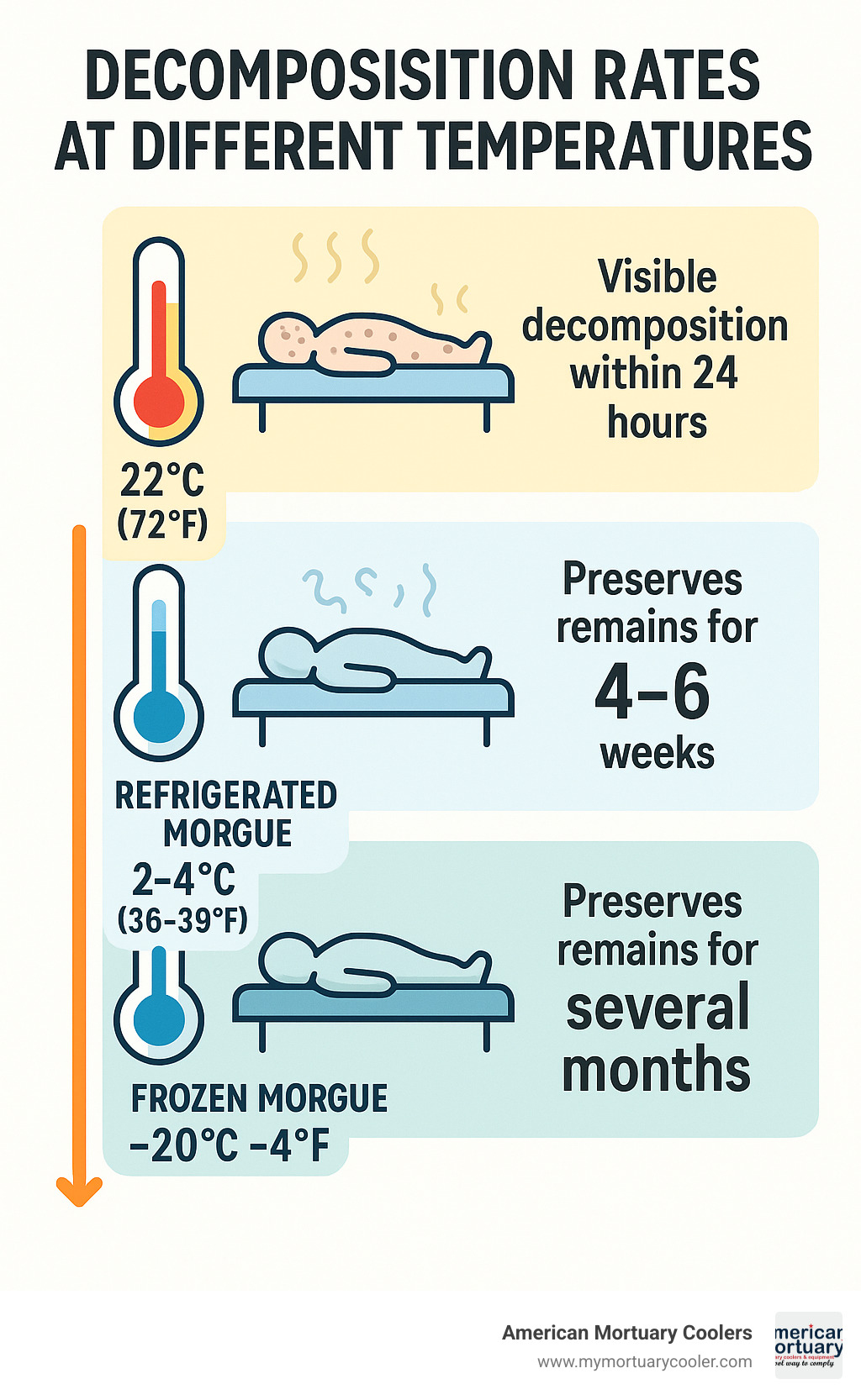
Easy refrigerated morgue word list:
- do refrigerated bodies at hospital morgues smell bad
- funeral home fridge
- portable morgue refrigeration
Refrigerated Morgue 101: Purpose, Temperature & Decomposition Science
When someone passes away, their body begins a natural process that doesn't wait for paperwork or funeral arrangements. That's where a refrigerated morgue comes in – creating a dignified pause in nature's timeline through the simple but powerful application of cold.
The science is fascinating but straightforward: cold temperatures dramatically slow down both bacterial growth and the body's own cellular breakdown processes. This gives families the precious gift of time during difficult moments.
"I've seen how proper refrigeration preserves dignity," shares one of our Tennessee technicians. "It's not just about temperature—it's about creating the right environment that honors the deceased while supporting those who remain."
For optimal preservation, industry standards have evolved around specific parameters:
- Temperatures between 2°C and 4°C (36°F to 39°F) for standard storage
- Carefully controlled humidity levels (typically 85-95%)
- Insulation thickness of 60-80mm using high-density materials
- Precise engineering to prevent temperature fluctuations
Finding this balance matters tremendously. Too cold, and tissues can be damaged by ice crystals. Too warm, and decomposition accelerates. The difference of just a few degrees can significantly impact how long a body can be properly preserved.
More info about temperature standards
This isn't just theoretical—it's backed by extensive scientific research showing how proper refrigeration extends preservation from mere hours to weeks:
Scientific research on corpse refrigeration
Positive vs. Negative Temperature Refrigerated Morgue Storage
Not all cold storage is created equal. In mortuary refrigeration, we work with two distinct temperature ranges, each serving different needs:
Positive Temperature Storage (2°C to 4°C)
This is what most people think of when imagining a refrigerated morgue. It's perfect for short-term preservation lasting days to several weeks. Funeral homes and hospitals typically rely on this range because it slows decomposition without freezing tissues, maintaining a natural appearance for viewings and allowing for easier examination when needed.
Negative Temperature Storage (-10°C to -50°C)
When longer preservation is necessary, freezing temperatures become essential. Medical examiners' offices, forensic facilities, and disaster response teams often require these colder environments. At these temperatures, decomposition nearly stops completely, preserving evidence integrity for extended investigations that might take months to complete.
"Some of our clients need both options," explains our installation specialist. "A county morgue might need standard refrigeration for routine cases, but also freezer capacity for those complex situations where more time is needed. We design systems that can handle both."
How Temperature Slows Biological Decay in a Refrigerated Morgue
The effectiveness of a refrigerated morgue comes down to basic biology and chemistry. Cold temperatures impact decomposition in two critical ways:
First, they dramatically slow bacterial growth. The microorganisms responsible for decomposition thrive in warmer environments—their activity nearly doubles with every 10°C increase in temperature. By keeping temperatures at 2-4°C, we're creating an environment where bacteria struggle to multiply, extending preservation significantly.
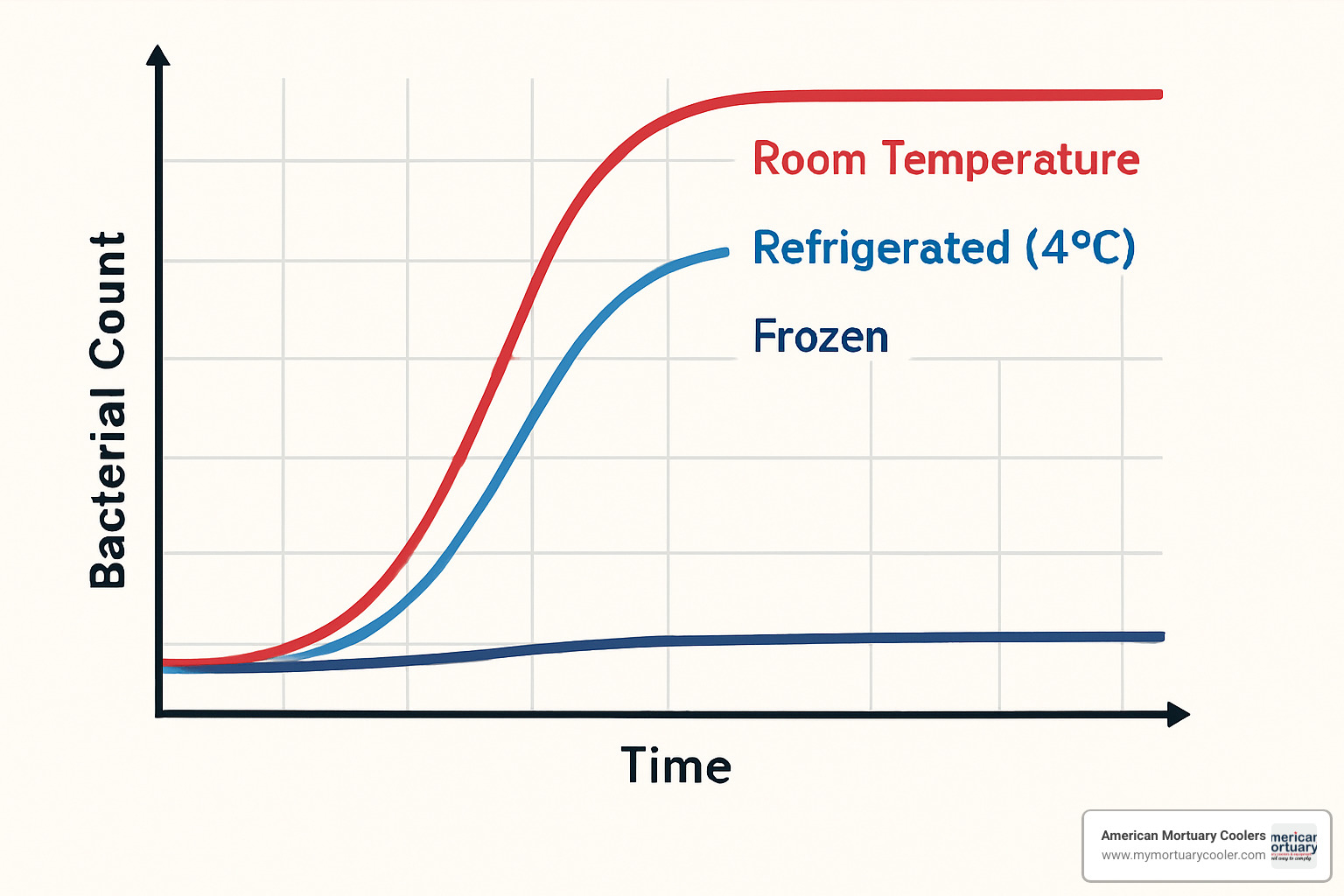
Second, cold temperatures reduce enzymatic activity within the body's own cells. Even after death, cellular enzymes continue their work, breaking down tissues from within—a process called autolysis. Refrigeration significantly slows these chemical reactions, preserving tissues much longer.
The practical benefits are meaningful for everyone involved:
Extended time for identification is crucial when working with unidentified remains. Proper refrigeration can extend this window from hours to weeks, giving authorities precious time to make notifications and arrangements.
Families gain flexibility for funeral planning, allowing relatives to travel from distant locations without rushing important decisions.
Evidence preservation becomes possible for forensic cases, maintaining the integrity of tissues and fluids that might be needed for investigation.
Odor control is significantly improved, creating a more comfortable environment for staff and visitors.
"We sometimes forget how much refrigeration technology has changed deathcare," notes our service coordinator. "Before modern cooling systems, families had very little time. Today's refrigerated morgue solutions give people the chance to say goodbye on their own timeline, and that's something we're proud to be part of."
Types of Refrigerated Morgue Units & Surge Options
When it comes to caring for the deceased, one size definitely doesn't fit all. At American Mortuary Coolers, we've installed just about every type of refrigerated morgue solution you can imagine – from single-body units in small-town funeral homes to massive walk-in systems for busy city medical examiners.
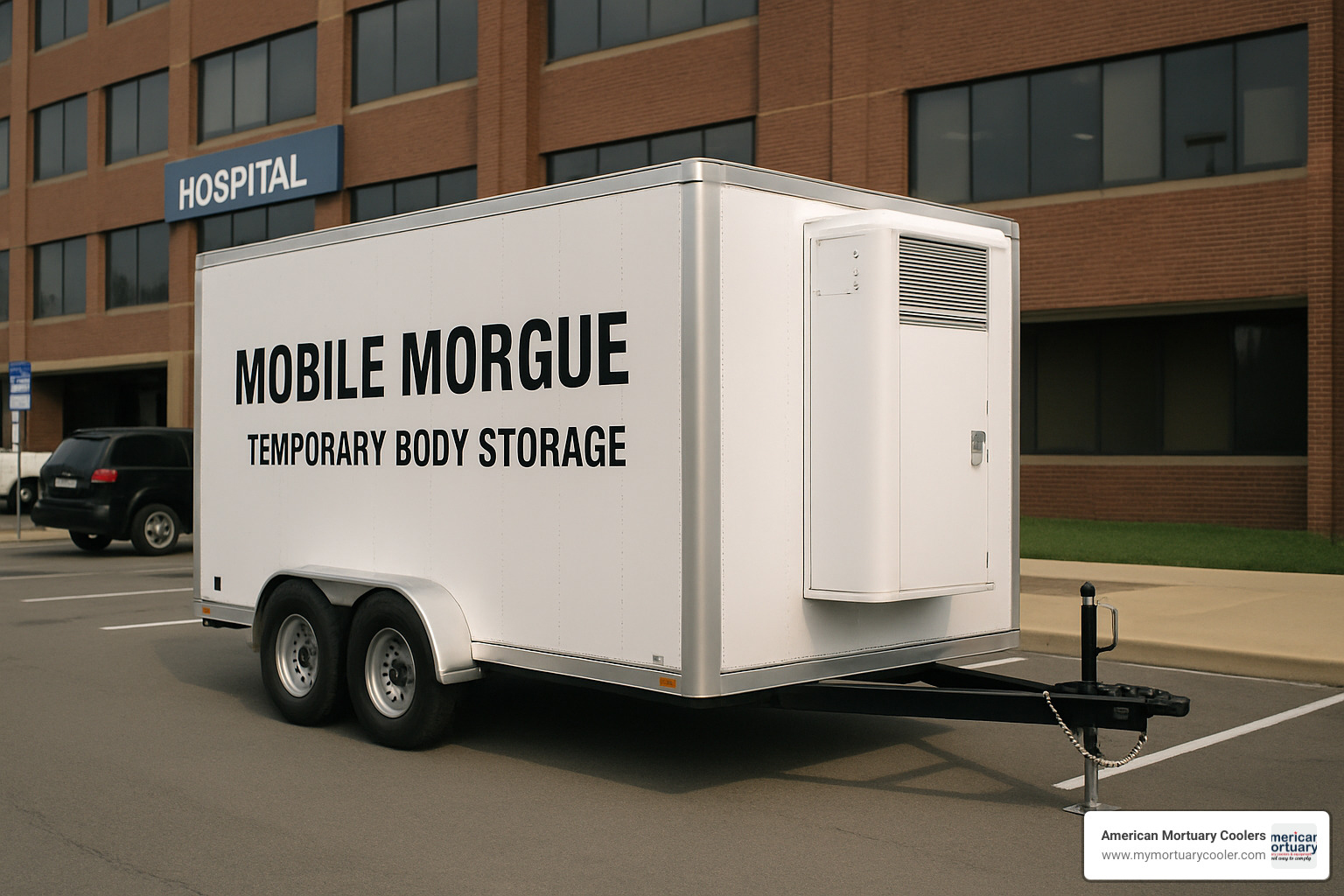
Think of refrigerated morgue options as being a bit like vehicles – some people need a compact car, others need a pickup truck, and sometimes you need a fleet of buses. What works perfectly for a rural funeral home in Tennessee might be completely inadequate for a medical examiner's office in Chicago.
Let me walk you through the main options we offer and help you understand which might be right for your facility.
Walk-in coolers are the workhorses of the industry, holding anywhere from 5 to 50+ bodies in a custom-built environment. They feature 4-inch insulated panels with stainless steel interiors, digital temperature controls, and vapor-proof lighting. These are ideal for hospitals, medical examiners, and larger funeral homes that handle a steady volume of cases.
Body-box refrigerators are perfect for smaller operations. These self-contained units hold between 1 and 23 bodies and come in front-loading, side-loading, or pass-through configurations. They're the go-to choice for small to medium funeral homes and rural hospitals with more modest needs.
Multi-tier cabinets make the most of limited space by stacking bodies vertically. They typically hold 2 to 12 bodies and feature stainless steel trays. If you're working with tight quarters but still need decent capacity, these units can be lifesavers.
"I remember a funeral director in Atlanta who was operating out of a historic building with tiny rooms," shares our Southeast Region specialist. "A three-tier cabinet gave him the capacity he needed without having to renovate the space. Sometimes the simplest solution is the best one."
For emergency situations, we offer mobile trailers ranging from 17' to 53' in length, capable of holding 16 to 90 remains. These units are compatible with generators, feature ramp access, and can be deployed quickly during disasters or pandemic surges.
We also provide specialized options like MERC liquid-cooling systems for field operations, CoolBot retrofit solutions for budget-conscious facilities (about $5,000 for an 8'×12' cooler with 25-body capacity), and bariatric specialty units designed specifically for larger decedents.
More info about morgue cooler options
Walk-In Refrigerated Morgue Rooms
If you need serious capacity and flexibility, walk-in refrigerated morgue rooms are the gold standard. These aren't off-the-shelf products – they're custom environments built to your exact specifications.
Our walk-in systems feature custom panel construction with prefabricated modular, precision-formed insulated panels that are 4 inches thick. They can be configured to hold anywhere from 2 to 50+ bodies using various rack systems. We use high-quality polyurethane insulation with an R-value of typically R-32 for maximum thermal efficiency.
Safety is paramount in these spaces, so we include vapor-proof lighting, digital temperature monitoring with alarm capabilities, and OSHA-compliant safety features like interior release handles.
"One of the best things about walk-ins is their adaptability," explains our Northeast specialist. "A medical examiner's office near Pittsburgh started with a 10-body capacity system. As their needs grew, we simply added panels and upgraded the refrigeration to handle 30 bodies – all without major disruption to their daily operations."
The construction process is methodical – we start with a thorough site assessment and custom design, then fabricate insulated panels to your exact specifications. Our team handles the on-site assembly, installation of refrigeration systems and controls, addition of interior racking and body trays, and finally, rigorous testing and commissioning.
For facilities handling more than 5-10 deaths weekly, a walk-in system usually makes more financial sense in the long run. While the initial investment is higher than cabinet options, the operational efficiency and ability to expand deliver better value over time.
Cabinet & Body Box Refrigerators
Not everyone needs the capacity of a walk-in cooler. For smaller facilities or those with space limitations, cabinet and body box refrigerators offer efficient refrigerated morgue solutions in a much smaller footprint.
These units typically feature 80mm high-density polyurethane foam insulation, stainless steel exteriors with seamless interiors that are easy to clean, and digital temperature displays with audible and visual alarms if temperatures drift outside the safe range.
"Body box refrigerators are perfect for facilities handling fewer than 5 cases per week," explains our Columbia, SC representative. "They provide hospital-grade refrigeration without requiring you to build a special room or spend a small fortune."
Our most popular cabinet configurations include single-body units (perfect for hospices or small funeral homes), 2-3 body vertical cabinets that make efficient use of limited floor space, 4-6 body horizontal cabinets for mid-sized facilities, and specialized bariatric units with reinforced construction for larger decedents.
One of the biggest advantages of these units is their plug-and-play nature. Unlike walk-in systems that require construction, many cabinet refrigerators can be up and running within hours of delivery – just plug them into a standard electrical outlet and they're ready to go.
A funeral director we work with in Georgia told us: "We chose a 3-body upright cooler because it plugs into a standard outlet, doesn't need any special drainage, and fits perfectly in our preparation room. I love being able to check the digital thermometer at a glance and know everything is exactly as it should be."
Mobile Trailers & Temporary Surge Solutions
Sometimes life throws the unexpected at us – natural disasters, pandemics, or other emergencies that create sudden, overwhelming demand for mortuary services. That's when mobile and temporary refrigerated morgue solutions become essential.
Our refrigerated trailers range from 17' to 53' in length and can hold between 16 and 90 remains. They feature sealed interiors to maintain proper temperatures, ramp access for easy loading and unloading, and the ability to run on either shore power or generators. These units are ideal for mass-casualty events, pandemic response, or temporary expansion of existing facilities.
For situations requiring even faster deployment, our rapid-deploy coolers can be set up in hours rather than days. They feature collapsible racks and minimal hardware, making them perfect for emergency response or field operations.
We also offer the MERC System (Mortuary Improved Remains Cooling), which uses direct-contact liquid cooling technology. This system is portable, scalable, and interoperable – making it ideal for military operations and disaster response scenarios.
"The pandemic taught us all about the importance of surge capacity," our Los Angeles representative reflects. "We helped dozens of hospitals quickly expand their capabilities with refrigerated trailers that could be operational within 24 hours of delivery. These weren't just cold storage – they were dignified solutions during an incredibly difficult time."
Mobile solutions offer several key advantages in emergency situations: they can be deployed rapidly, scaled up or down as needs change, relocated as hot spots shift, and rented rather than purchased for temporary surges.
As one county emergency management director told us, "When we faced a 300% increase in deaths during the pandemic surge, the refrigerated trailer from American Mortuary Coolers was literally a lifesaver for our overwhelmed system. It gave us dignified storage capacity when we needed it most."
For communities preparing for potential mass-casualty events, having pre-arranged access to mobile refrigerated morgue solutions should be part of comprehensive emergency planning. After all, it's always better to have a plan and not need it than to need a plan and not have it.
Selecting, Installing & Operating a Refrigerated Morgue
Choosing the right refrigerated morgue system requires careful consideration of numerous factors. At American Mortuary Coolers, we guide clients through a comprehensive evaluation process to ensure their investment meets both current and future needs.
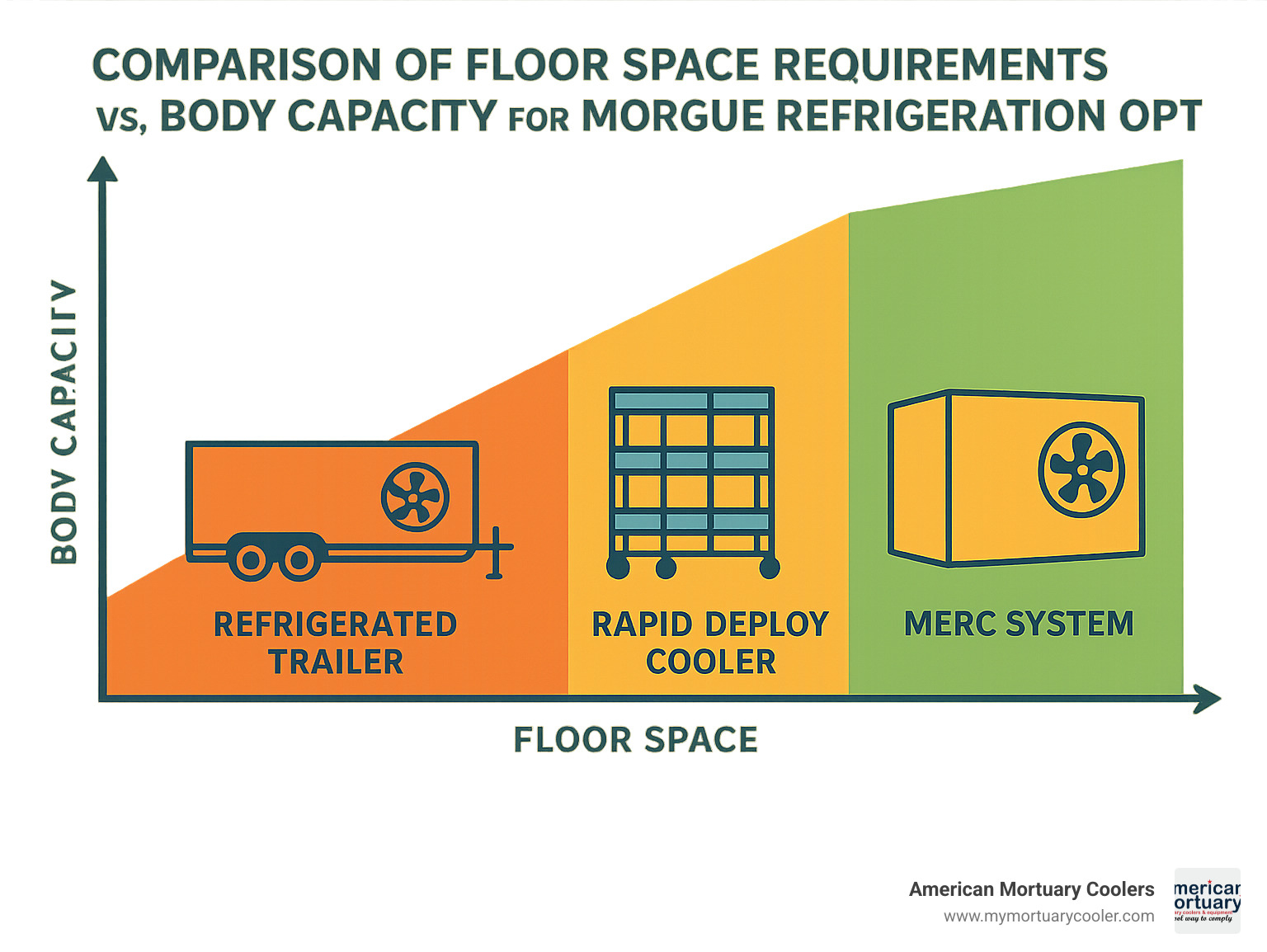
The selection process should include these key considerations:
Site Assessment
- Available floor space and ceiling height
- Existing electrical service (110V vs. 208-230V)
- Ventilation capabilities (5-6 air changes per hour recommended)
- Floor load capacity for heavy units
- Access for installation and body transport
Operational Requirements
- Average and peak case volume
- Typical duration of storage
- Types of cases (standard, bariatric, infectious)
- Staff workflow patterns
- Future growth projections
Technical Specifications
- Temperature range requirements (positive vs. negative)
- OSHA-compliant safety features
- NFPA and EISA 2007 compliance
- Energy efficiency and R-value considerations
- Antimicrobial surface treatments
Budget Considerations
- Initial purchase cost
- Installation expenses
- Operating costs (energy consumption)
- Maintenance requirements
- Expected service life
"The biggest mistake we see is facilities choosing units based solely on current needs without considering future growth," warns our New York NY specialist. "A refrigerated morgue should be viewed as a long-term investment with a 15-20 year horizon."
Capacity Planning & Scalability
Effective capacity planning is essential when selecting a refrigerated morgue system. At American Mortuary Coolers, we help clients analyze several factors:
Current vs. Future Needs
- Historical case volume trends
- Population growth projections
- Aging demographics in service area
- Seasonal fluctuations in mortality
Redundancy Requirements
- Backup cooling systems
- Emergency power connections
- Alternative storage options during maintenance
Flexibility Considerations
- Modular systems that allow expansion
- Bariatric capacity for larger decedents
- Specialized storage for infectious cases
Our Atlanta-based planning team recommends: "Take your highest monthly average over the past three years, add 25% for unexpected surges, then add another 15-20% for future growth. That's your minimum capacity target."
For facilities with space constraints, we often recommend:
- Vertical Storage Solutions: Multi-tier racks maximize capacity per square foot
- Combination Systems: Mix of permanent and on-call temporary units
- Phased Implementation: Infrastructure ready for expansion when needed
A hospital morgue coordinator in our Pacific Region shares: "We initially installed a 6-body walk-in cooler but designed the space to accommodate expansion to 12 bodies. Three years later, when we needed that additional capacity, the expansion was completed in just two days with minimal disruption."
Construction Materials & Key Components
The durability and performance of a refrigerated morgue system depend heavily on construction materials and component quality. At American Mortuary Coolers, we emphasize these critical elements:
Exterior Construction
- Type 304 stainless steel for fronts and exposed surfaces
- Stucco-embossed aluminum for sides and backs
- Corrosion-resistant hardware and fixtures
- Seamless corners to prevent bacterial harborage
Insulation
- High-density polyurethane foam (80mm minimum)
- Closed-cell structure to prevent moisture intrusion
- R-values of 32+ for optimal energy efficiency
- Vapor barriers on warm sides to prevent condensation
Refrigeration Components
- Self-contained refrigeration systems where possible
- Digital temperature controllers with ±1°C precision
- Redundant cooling capacity for critical applications
- Low-noise compressors for quiet operation
Interior Features
- Seamless, washable surfaces for disinfection
- Vapor-proof LED lighting fixtures
- Stainless steel body trays with rollers
- Self-closing doors with magnetic gaskets
"The materials used in morgue refrigeration must withstand harsh cleaning chemicals while maintaining thermal efficiency," explains our technical director. "We use only hospital-grade materials that balance durability, cleanability, and performance."
One innovation we've incorporated in recent years is SmartProtec® antimicrobial finish on all panel surfaces. This technology actively reduces bacterial growth on surfaces, enhancing both hygiene and odor control.
Regulatory & Safety Compliance
Operating a refrigerated morgue involves navigating numerous regulatory requirements. American Mortuary Coolers ensures all our systems meet or exceed applicable standards:
Health Department Requirements
- Temperature maintenance between 2-4°C (36-39°F)
- Continuous temperature monitoring and logging
- Proper ventilation (5-6 air changes per hour)
- Appropriate drainage and waste handling
OSHA Compliance
- Interior release mechanisms on all doors
- Non-slip flooring surfaces
- Proper lighting levels (minimum 50 foot-candles)
- Emergency backup systems
Building Codes
- NFPA standards for electrical components
- EISA 2007 requirements for energy efficiency
- ADA accessibility considerations
- Local building permit requirements
Industry-Specific Regulations
- Cities with populations over 5,000 often require refrigeration chambers capable of maintaining -2°C to 4°C
- CDC guidelines for handling infectious remains
- OSHA Bloodborne Pathogens Standard compliance
"Navigating the regulatory landscape can be challenging," acknowledges our compliance specialist. "We work closely with local authorities to ensure each installation meets all applicable requirements from day one."
Our Pittsburgh PA team recently helped a county morgue resolve compliance issues with their aging refrigeration system: "The facility faced potential citations for temperature fluctuations outside acceptable ranges. We installed a new system with continuous monitoring and automatic alerts that not only resolved the compliance issues but also reduced their energy costs by 22%."
Routine Maintenance & Hygiene Protocols
Proper maintenance ensures the longevity and reliability of refrigerated morgue systems while maintaining hygienic conditions. American Mortuary Coolers recommends these essential practices:
Daily Checks
- Temperature verification and logging
- Visual inspection of gaskets and seals
- Assessment of condensate drainage
- Confirmation of alarm functionality
Weekly Procedures
- Complete interior cleaning with hospital-grade disinfectants
- Inspection of door hardware and latches
- Cleaning of condenser coils (if accessible)
- Testing of backup systems
Quarterly Maintenance
- Professional inspection of refrigeration components
- Calibration of temperature monitoring systems
- Lubrication of moving parts
- Filter replacement
Annual Service
- Comprehensive system evaluation
- Refrigerant level check and recharge if needed
- Electrical component testing
- Recalibration of all controls
"The key to long-term performance is consistent preventive maintenance," emphasizes our service coordinator. "A properly maintained refrigerated morgue system should provide 15-20 years of reliable service."
For cleaning and disinfection, we recommend:
- Quaternary ammonium compounds for routine cleaning
- Sodium hypochlorite (bleach) solutions for decontamination after infectious cases
- Hydrogen peroxide-based systems for deep cleaning
- Avoiding abrasive cleaners that can damage surfaces
A funeral home director in our Southeast Region shares: "We maintain a detailed maintenance log that's become part of our accreditation documentation. The systematic approach American Mortuary Coolers helped us develop has prevented any significant downtime for over eight years."
Innovations Changing Refrigerated Morgue Design
The refrigerated morgue industry continues to evolve with technological advances that improve performance, efficiency, and functionality. American Mortuary Coolers stays at the forefront of these innovations:
Antimicrobial Surface Technologies
- SmartProtec® coatings that actively inhibit bacterial growth
- Nano-silver impregnated materials for continuous protection
- Self-sanitizing surfaces that reduce biofilm formation
Energy Efficiency Improvements
- Transition to R290 (propane) and CO₂ refrigerants
- Variable-speed compressors that match cooling to demand
- Advanced insulation materials with higher R-values
- LED lighting with motion sensors
Monitoring and Control Systems
- WiFi-enabled temperature monitoring with mobile alerts
- 30-day temperature history logging
- Remote diagnostics and troubleshooting
- AI-powered predictive maintenance
Alternative Cooling Technologies
- CoolBot systems that convert standard air conditioners
- Direct liquid cooling for rapid temperature reduction
- Solar-powered options for remote locations
- Hybrid systems combining multiple cooling technologies
"The CoolBot technology has been for smaller facilities," notes our innovation specialist. "It allows a standard window air conditioner to maintain morgue-appropriate temperatures, reducing both initial investment and operating costs."
A medical examiner in our Rocky Mountain Region recently implemented our latest monitoring system: "The ability to receive real-time alerts on my phone gives me peace of mind. During a recent power outage, I was notified immediately and could initiate our backup protocol before temperatures began to rise."
Frequently Asked Questions about Refrigerated Morgues
I've spent years talking with funeral directors, hospital administrators, and medical examiners about their refrigerated morgue needs. These are the questions that come up most often in those conversations:
How cold is a standard refrigerated morgue?
A standard refrigerated morgue keeps bodies at a temperature between 2°C and 4°C (36°F and 39°F). This sweet spot does an excellent job slowing decomposition while keeping tissues in good condition for viewings and autopsies.
When I visit forensic facilities, I often see specialized freezers running much colder, typically around -20°C (-4°F). These negative-temperature units are perfect when remains need to be preserved for many months or when preserving specific forensic evidence is critical.
Every professional system we install at American Mortuary Coolers includes digital displays you can read at a glance, alarms that alert you if temperatures drift too high or low, detailed temperature history logging, and backup cooling capacity for peace of mind.
"Getting the temperature right is only half the battle," I often tell clients during installation. "Keeping it stable is just as important. Temperature swings can actually speed up decomposition, which is why our systems maintain precision within one degree even when your staff is constantly opening and closing doors."
More info about morgue freezer temperature
How long can a body stay in a refrigerated morgue?
In a properly maintained refrigerated morgue at 2-4°C, most bodies can remain for 4-6 weeks before significant decomposition becomes apparent. I've noticed several factors that can shorten or lengthen this timeframe:
The delay between death and refrigeration makes a huge difference. A body that's cooled within hours of death will preserve much better than one that spent a day at room temperature first.
Body condition matters too - pre-existing disease, trauma, or obesity can speed up the natural processes. Every refrigerated morgue also needs rock-solid temperature stability, as even brief warm periods can accelerate decomposition dramatically.
For frozen storage at -20°C or below, I've seen remains preserved for several months while still maintaining recognizable features, though tissue quality does gradually deteriorate even in these frigid conditions.
One funeral director in Mississippi told me something I now share with all my clients: "Refrigeration buys you time, but it's still just borrowed time." It provides a window for identification, investigation, or funeral planning, but that window isn't open forever.
For identification purposes, facial recognition typically remains possible for 2-3 weeks in properly refrigerated conditions, which is particularly valuable when working with unidentified remains.
What maintenance does a refrigerated morgue require?
A refrigerated morgue is like any precision equipment - it needs regular attention to perform reliably. After installing hundreds of systems across the country, here's what I recommend to keep yours running smoothly:
Daily attention makes all the difference. Take a moment each morning to check and log temperatures, inspect door seals for proper closure, verify your alarm systems are active, and clean up any visible spills or contamination immediately.
Quarterly professional service will catch small issues before they become big problems. Have a technician inspect all refrigeration components, clean those condenser coils (they get dusty!), check refrigerant levels, test your backup systems, and lubricate all door hinges and latches.
Once a year, schedule a comprehensive evaluation where everything gets a thorough once-over: calibration of all temperature controls, inspection of electrical components, deep cleaning of all surfaces, and replacement of any worn gaskets or seals.
"The most expensive service call is the one you make in an emergency," I often remind my clients. "Regular maintenance might seem like an unnecessary expense when everything's working fine, but it's actually your cheapest insurance against catastrophic failure."
For walk-in coolers specifically, don't forget to regularly check floor drains for clogs, test those emergency release handles (required by OSHA), and inspect your rack systems to ensure they remain stable and secure.
With proper care, your refrigerated morgue should serve you reliably for 15-20 years or more. Many of the systems we installed back when I first started with American Mortuary Coolers are still running perfectly today because their owners followed these simple maintenance protocols.
Conclusion & Next Steps
Choosing the right refrigerated morgue system is more than a technical decision—it's a reflection of our commitment to honoring those who have passed and supporting families during their most vulnerable moments.
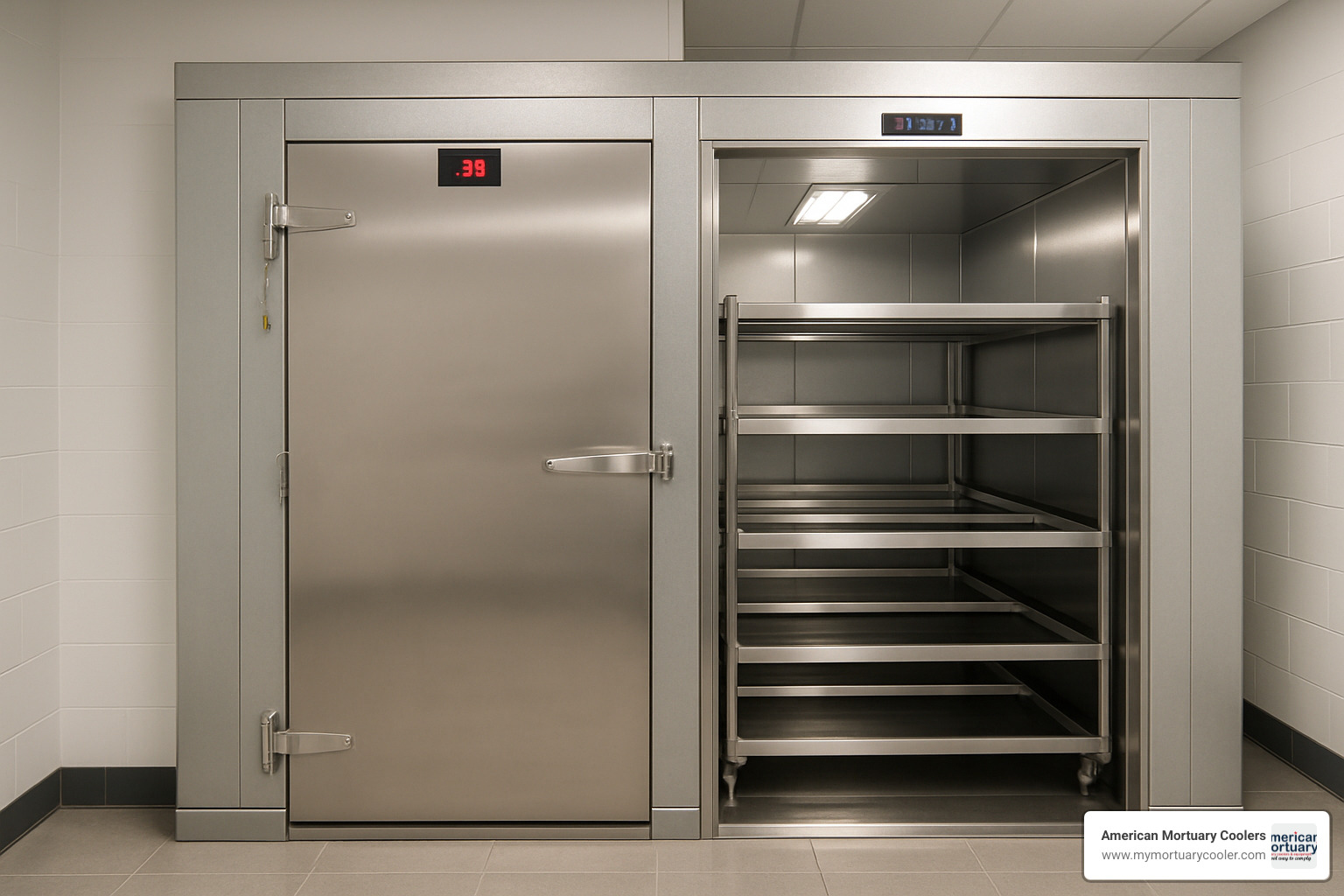
Here at American Mortuary Coolers, we've walked alongside countless funeral homes, hospitals, and medical examiners as they steer these important choices. From our cozy headquarters in Tennessee, we've learned that every facility has its own story and unique needs. The small-town funeral home in Montana faces different challenges than the busy county morgue in Florida—and we're here for both of them.
"I remember working with a rural hospital that thought they couldn't afford proper refrigeration," shares our installation manager. "When we showed them how a custom solution could fit their budget while meeting their needs, the relief on their faces was unforgettable. That's why we do this work."
Our approach blends technical know-how with genuine care for the sensitive nature of deathcare. We're not just selling refrigeration units—we're providing peace of mind during difficult times.
Whether you're building a new facility from the ground up or upgrading equipment that's seen better days, our team brings the same thoughtful attention to your project. We offer custom design services custom to your specific requirements, with nationwide installation across all 48 contiguous states. And we don't disappear after installation—our ongoing support includes maintenance programs and technical assistance whenever you need it.
Sometimes the unexpected happens, and that's when our emergency response capabilities become crucial. During natural disasters or public health crises, we can rapidly deploy temporary solutions to communities in need.
"The right refrigerated morgue doesn't just preserve remains," our operations director often says. "It preserves dignity and provides families the precious gift of time—time to gather, to process, to begin healing."
As facilities face increasing case volumes and families need more flexibility for gathering and planning, investing in proper refrigeration technology has never been more important. Let us help you create a solution that serves your community with the respect it deserves.
For more information about how American Mortuary Coolers can address your specific refrigeration needs, reach out to our team. We're real people who understand your challenges and care about helping you overcome them.
More info about the leading supplier of morgue coolers
From all of us at American Mortuary Coolers, we look forward to supporting your important work with solutions that balance performance, efficiency, and value—because everyone deserves to be treated with dignity, even after they're gone.



















